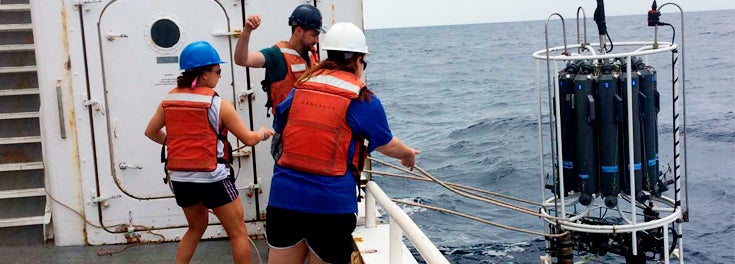
After a week aboard the University of Rhode Island’s 185-foot research ship Endeavor, senior Jillon McGreal was exhausted. But she also called the experience of taking a marine biology class aboard the ship “amazing and rare.”
Rare indeed. The ocean ecology class was the first of its kind at URI—but not the last —and may be the only class like it for undergraduates at any university anywhere. On a 110-mile journey south to the edge of the continental shelf with Associate Professor Brad Seibel, the students collected and studied creatures living at various depths in the open ocean and learned to use oceanographic research equipment. Before the trip, they spent a week in classroom and laboratory learning about the creatures they might see, discussing research papers, and learning how to collect data.
On a 110-mile journey south to the edge of the continental shelf, the students collected and studied creatures living at various depths in the open ocean and learned to use oceanographic research equipment.
Aboard the Endeavor and in waters more than a mile deep, the students’ daily activities were scuba diving to collect specimens, trawling for fish as deep as 1,800 meters, jigging for squid, conducting measurements of the physical characteristics of the water column, and helping scientists from URI and other universities with their research.
“Animals in the open ocean are very different from those in closer to shore because they have nowhere to hide,” Professor Seibel said. “They have all sorts of adaptations to live there. Many are gelatinous, which allows them to be neutrally buoyant, transparent or bioluminescent.”
In addition to many varieties of fish, the students captured several species of bioluminescent squid, gulper eels whose jawbones are 10 times the length of their skull, a wide range of jellyfish relatives, and numerous microscopic organisms.
Jillon was surprised at how much she enjoyed the physical labor involved in working with the ship’s crew. “I loved being right there hauling in the net, or steadying equipment with slip lines,” she said. “It was great to see how important teamwork is when deploying or recovering the nets.”
Senior marine biology major Katie Viducic enrolled in the class because it was a unique opportunity that would look good on her resume. She enjoyed the hands-on nature of the class and the chance to learn about all of the equipment used in oceanographic research.
“My favorite part was identifying and learning about the organisms we collected, which was also one of the most challenging parts because everything was so new to us,” said Katie, who is planning a career studying sharks.
“This experience just caused my love for the ocean and marine life to grow immensely,” added Jillon. “Because of this class, I was able to make stronger connections with people in the professional marine biology world, and it became more clear to me that I want to continue on to graduate school and do research. I learned a lot about pelagic ecology, but the whole process of going on a research cruise was invaluable.”
